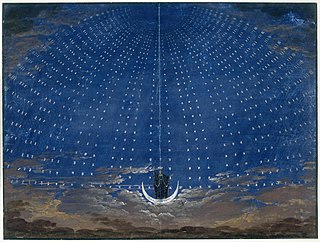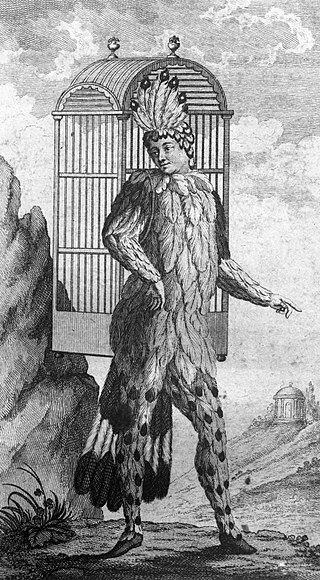
Wolfgang Amadeus Mozart was a prolific and influential composer of the Classical period. Despite his short life, his rapid pace of composition and proficiency from an early age resulted in more than 800 works representing virtually every Western classical genre of his time. Many of these compositions are acknowledged as pinnacles of the symphonic, concertante, chamber, operatic, and choral repertoire. Mozart is widely regarded as one of the greatest composers in the history of Western music, with his music admired for its "melodic beauty, its formal elegance and its richness of harmony and texture".

The Magic Flute, K. 620, is an opera in two acts by Wolfgang Amadeus Mozart to a German libretto by Emanuel Schikaneder. The work is in the form of a Singspiel, a popular form during the time it was written that included both singing and spoken dialogue. The work premiered on 30 September 1791 at Schikaneder's theatre, the Freihaus-Theater auf der Wieden in Vienna, just two months before the composer's death. It was the last opera that Mozart composed. The opera was an outstanding success from its first performances, and remains a staple of the opera repertory to this day.
The siciliana or siciliano is a musical style or genre often included as a movement within larger pieces of music starting in the Baroque period. It is in a slow 6
8 or 12
8 time with lilting rhythms, making it somewhat resemble a slow jig or tarantella, and is usually in a minor key. It was used for arias in Baroque operas, and often appears as a movement in instrumental works. Loosely associated with Sicily, the siciliana evokes a pastoral mood, and is often characterized by dotted rhythms that can distinguish it within the broader musical genre of the pastorale.

The Theater an der Wien is a historic theatre in Vienna located on the Left Wienzeile in the Mariahilf district. Completed in 1801, the theatre has hosted the premieres of many celebrated works of theatre, opera, and symphonic music. Since 2006, it has served primarily as an opera house, hosting its own company.

Emanuel Schikaneder was a German impresario, dramatist, actor, singer, and composer. He wrote the libretto of Wolfgang Amadeus Mozart's opera The Magic Flute and was the builder of the Theater an der Wien. Peter Branscombe called him "one of the most talented theatre men of his era". Aside from Mozart, he worked with Salieri, Haydn and Beethoven.

Kevin Roderick Sullivan is a Canadian writer, director and producer of film and television programs. He is best known for detailed period movies such as the Anne of Green Gables series of films, his movie adaptation of Timothy Findley's novel The Piano Man's Daughter, feature films and TV-movies such as Under the Piano, Butterbox Babies, Sleeping Dogs Lie and the CBS mini-series Seasons of Love, as well as long-running television series such as Road to Avonlea and Wind at My Back.

The Magic Flute is Ingmar Bergman's 1975 film version of Wolfgang Amadeus Mozart's opera Die Zauberflöte. It was intended as a television production and was first shown on Swedish television on 1 January 1975, but was followed by a theatrical release later that year. The work is widely viewed as one of the most successful films of an opera ever made, and as an unusual item among the director's works.
Gösta Winbergh was a Swedish tenor.

The Magic Flute is a 2006 romantic fantasy film directed by Kenneth Branagh, adapted from Wolfgang Amadeus Mozart's singspiel Die Zauberflöte. An international co-production between France and the United Kingdom, it was produced by Idéale Audience and in association with UK's Peter Moores Foundation.

Diana Damrau is a German soprano who has achieved international fame for her performances, primarily in opera, but also in concert and lieder. She has been successful in coloratura soprano roles since her early career, and gradually proceeded into heavier roles of the 19th-century Italian bel canto repertoire. Her signature roles include the Queen of the Night in The Magic Flute, Zerbinetta in Ariadne auf Naxos, Lucia in Lucia di Lammermoor, and Violetta in La traviata.

Hans Warren Christie is a Canadian television and film actor known for his roles as Ray Cataldo on the ABC drama October Road and as Aidan "Greggy" Stiviletto on the ABC series Happy Town. More recently, Christie starred as Cameron Hicks in the SyFy series Alphas.

Anthony Rolfe Johnson was an English operatic tenor.
The composer Wolfgang Amadeus Mozart (1756–1791) led a life that was dramatic in many respects, including his career as a child prodigy, his struggles to achieve personal independence and establish a career, his brushes with financial disaster, and his death in the course of attempting to complete his Requiem. Authors of fictional works have found his life a compelling source of raw material. Such works have included novels, plays, operas, and films.
The Magic Flute (1791) is an opera by Wolfgang Amadeus Mozart. Other notable works with this title include:

Mozart Decoded is a 2008 documentary about the life of Wolfgang Amadeus Mozart produced by Sullivan Entertainment. The film was made as a follow-up to Sullivan Entertainment's Magic Flute Diaries and uses a lot of the same visual material. The program premiered on December 20, 2008, on A-Channel in Canada.

Mozart's birthplace is the birthplace of Wolfgang Amadeus Mozart at No. 9 Getreidegasse in Salzburg, Austria. The Mozart family resided on the third floor from 1747 to 1773. Mozart himself was born here on 27 January 1756. He was the seventh child of Leopold Mozart, who was a musician of the Salzburg Royal Chamber.

The Magic Flute, an opera by Wolfgang Amadeus Mozart with libretto by Emanuel Schikaneder, was composed in 1791 and premiered to great success. It has been an important part of the operatic repertory ever since, and has inspired a great number of sequels, adaptations, novels, films, artwork, and musical compositions.
Carl Bissuti was an Austrian operatic bass

The Magic Flute is a 2022 German musical fantasy film directed by Florian Sigl and written by Andrew Lowery, based on the 1791 opera of the same name by Wolfgang Amadeus Mozart.
Ruben Drole is a Swiss operatic bass-baritone.














